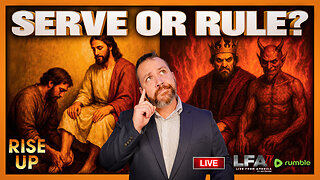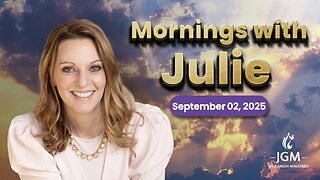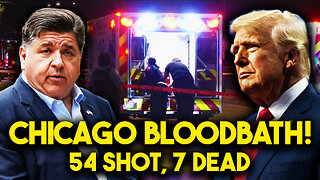Premium Only Content

Saving Private Biden
George Webb joins Peter Duke to discuss the desperate push by Hollywood to prop up the American Empire.
Linking D-Day to Ukraine Conflict
Tom Hanks’ recent comments have stirred controversy, particularly his attempt to draw parallels between D-Day and the current conflict in Ukraine. Hanks stated that the sacrifices made during D-Day are reminiscent of the ongoing struggle in Ukraine, framing both situations as battles against authoritarian aggression. The hosts of “Saving Private Biden” argue that this comparison is a gross oversimplification, distorting the complex geopolitical realities of both events. They contend that Hanks’ remarks reflect a shallow understanding of history and serve more as political rhetoric than informed analysis.
Media’s Role in Shaping Historical Perception
Hanks’ involvement in historical films like “Saving Private Ryan” has significantly influenced public perception of World War II. The hosts critique this influence, suggesting that while such films can bring attention to historical events, they often do so at the cost of accuracy. They argue that audiences are more likely to remember the dramatized versions of history presented in films rather than the nuanced, often messier reality. This, they claim, leads to a distorted understanding of historical events, where cinematic portrayals become the primary source of information for many people.
Critique of Simplified Narratives
The hosts take issue with Hanks’ tendency to present complex historical and current events in a manner that is easily digestible but ultimately misleading. By framing D-Day and the Ukraine conflict as similar struggles against tyranny, Hanks is seen as ignoring the specific historical contexts and political dynamics that differentiate these events. The hosts argue that such simplifications contribute to a binary worldview, where complex issues are reduced to good versus evil narratives. This not only misinforms the public but also hampers the development of a critical and informed citizenry.
Historical Inaccuracies in Film
The discussion also touches on specific historical inaccuracies in Hanks’ films. For example, the hosts mention that the final battle scene in “Saving Private Ryan,” set at a fictitious bridge, did not occur as depicted. They argue that while artistic license is a common practice in filmmaking, it becomes problematic when these dramatizations are taken as historical fact. The hosts stress the importance of differentiating between historical fiction and historical fact, urging viewers to seek out credible sources for a more accurate understanding of history.
The Impact of Celebrity Endorsements
Tom Hanks, as a beloved and influential public figure, wields significant power in shaping public opinion. The hosts argue that when Hanks makes statements about historical events or current conflicts, many people take his words at face value due to his celebrity status. This, they argue, is dangerous because it allows simplified and sometimes erroneous narratives to gain traction. The hosts call for celebrities like Hanks to use their platforms responsibly, ensuring that they promote informed and nuanced discussions rather than simplistic and politically motivated rhetoric.
The Importance of Critical Media Consumption
The hosts emphasize the need for critical media consumption, particularly when it comes to historical narratives presented by influential figures like Tom Hanks. They argue that the public should be encouraged to question and critically evaluate the information they receive from media and celebrities. By fostering a culture of critical thinking, the hosts believe that society can develop a more accurate and nuanced understanding of history and current events, ultimately leading to more informed decision-making and public discourse.
Summary of Expanded Points
Linking D-Day to Ukraine: Critique of Hanks’ oversimplified comparison between D-Day and the Ukraine conflict, arguing it distorts complex geopolitical realities.
Media Influence on History: Discussion on how films like “Saving Private Ryan” shape public perception of historical events more than actual historical records.
Simplified Narratives: Critique of Hanks’ tendency to present complex events in easily digestible but misleading ways, contributing to a binary worldview.
Historical Inaccuracies in Film: Highlighting specific inaccuracies in Hanks’ films and the importance of distinguishing between historical fiction and fact.
Celebrity Influence: Analysis of the impact of celebrity endorsements on public opinion and the responsibility that comes with such influence.
Critical Media Consumption: Emphasis on the need for the public to critically evaluate media narratives and seek out credible sources for accurate information.
-
 LIVE
LIVE
GritsGG
1 hour agoRumble Customs! 3515 Ws! 🫡!
281 watching -
 LIVE
LIVE
Wendy Bell Radio
4 hours agoThe Party Of Workers
6,780 watching -
 LIVE
LIVE
LFA TV
3 hours agoLFA TV ALL DAY STREAM - TUESDAY 9/2/25
6,774 watching -
 5:15:18
5:15:18
Times Now World
7 hours agoLIVE | Xi and Putin Unite in Beijing For China's Military Day Parade & WW2 Victory Day
2.62K -
 1:27:10
1:27:10
JULIE GREEN MINISTRIES
3 hours agoLIVE WITH JULIE
76.6K150 -
 LIVE
LIVE
The Bubba Army
4 days agoChicago BloodBath! 54 Shot, 7 Dead- Bubba the Love Sponge® Show | 9/02/25
3,136 watching -
 2:01:30
2:01:30
BEK TV
4 days agoTrent Loos in the Morning - 9/2/2025
17.3K1 -
 10:47
10:47
Nikko Ortiz
19 hours ago15 Seconds Of Fame Gone WRONG...
138K15 -
 14:47
14:47
GritsGG
1 day agoRumble Tournament Dubular! Rebirth Island Custom Tournament!
94.3K5 -
 1:36:05
1:36:05
Side Scrollers Podcast
22 hours agoStreamer ATTACKS Men Then Cries Victim + Pronoun Rant Anniversary + More | Side Scrollers
103K13